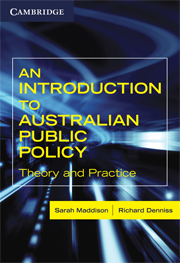Book contents
- Frontmatter
- Contents
- List of figures
- List of tables
- List of case studies exercises, and original contributions
- Foreword
- PART 1 Policy and theory
- Introduction
- 1 The australian policy context
- 2 State or market I: Ideology and public policy
- 3 State or market II: The economics of public policy
- 4 Models and theory for understanding policy
- 5 Policy actors and policy instruments
- 6 Identifying issues: Agenda setting and policy discourse
- PART 2 Policy in practice
- References
- Index
- References
4 - Models and theory for understanding policy
- Frontmatter
- Contents
- List of figures
- List of tables
- List of case studies exercises, and original contributions
- Foreword
- PART 1 Policy and theory
- Introduction
- 1 The australian policy context
- 2 State or market I: Ideology and public policy
- 3 State or market II: The economics of public policy
- 4 Models and theory for understanding policy
- 5 Policy actors and policy instruments
- 6 Identifying issues: Agenda setting and policy discourse
- PART 2 Policy in practice
- References
- Index
- References
Summary
Thus far in this book we have considered definitions of policy, the political context in which policy is made, and the ideological and economic forces that influence and constrain policy work. In this chapter we build on the discussion in the introduction that considered policy as authorised choice and policy as structured interaction to look at some theoretical approaches to understanding how policy is made. The most influential of these approaches is what is known as the policy process model. In the first half of this chapter we provide an outline of this model and address its uses and shortcomings for those engaging in policy work. In the second half of the chapter we outline some of the key theoretical tools that are needed in order to develop a richer understanding of the policy process.
Both the theory and the practice of policy work are central to the broad field of ‘policy studies’. The various sub-fields of policy studies have together produced a vast ocean of theoretical and empirical literature. It is only possible for us to dip our toe into that ocean here, but in doing so we will provide an overview of the key theoretical concerns that have preoccupied the field.
Rationalism and incrementalism
A key area of policy theorising that will be considered in this chapter is the body of work that sees public policy decision making as either rational or incremental in style.
- Type
- Chapter
- Information
- An Introduction to Australian Public PolicyTheory and Practice, pp. 82 - 101Publisher: Cambridge University PressPrint publication year: 2009



